Basil downy mildew has been confirmed in greenhouse grown sweet basil in central New Jersey. This is the first confirmed report of BDM in the state and region this growing season. All basil growers are encouraged to scout their fields or greenhouses on a daily basis. [Read more…]
Vegetable Crops Edition
Seasonal updates and alerts on insects, diseases, and weeds impacting vegetable crops. New Jersey Commercial Vegetable Production Recommendations updates between annual publication issues are included.
Subscriptions are available via EMAIL and RSS.
Quick Links:
 NJ Commercial Vegetable Production Recommendations
NJ Commercial Vegetable Production Recommendations
 Rutgers Weather Forecasting - Meteorological Information important to commercial agriculture.
Rutgers Weather Forecasting - Meteorological Information important to commercial agriculture.
Controlling Rhizoctonia root rot
Rhizoctonia root rot has been reported over the past week. Rhizoctonia root rot, caused by Rhizoctonia solani, is an important soil-borne fungal pathogen with a very large host range. The pathogen can survive saprophytically on living or dead plant material (organic matter) or as sclerotia in the soil (for more than 3 years). Disease development is favored by warm temperatures, dry (or very well drained) soils and stressed plants. Symptoms of Rhizoctonia root rot may begin as stunted plant growth (with poor root systems) with the appearance of brown lesions at the base of the stem causing wilting with lesions eventually girdling the stem and killing the infected plant. Rhizoctonia root rot infections only extend about an inch above the soil surface (Figure 1), unlike Phytophthora blight infection which can extend much farther up the stem. [Read more…]
Vegetable IPM update 5/22/25
Greetings from the Veg IPM team! No major changes have taken place between last week and this week, and with the continuing rainy weather, scouting has been limited.
Sweet Corn
We’ve put out corn earworm pheromone traps throughout the state. While silking corn is the main target of CEW activity, we set the traps early to detect overwintering moths. We’ve seen quite a few already, showing that some CEW moths are definitely overwintering in both North and South New Jersey. So far, we haven’t spotted any serious corn pests through visual inspection.
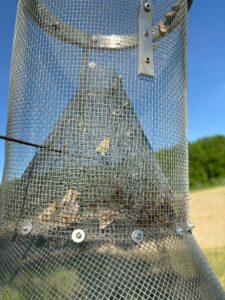
Corn earworm moths captured this week in Burlington County. Picture by Maria Cramer
Cole Crops
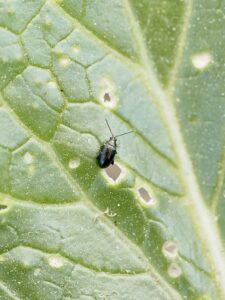
Flea beetle surrounded by feeding damage. Picture by Maria Cramer.
Flea beetle remain active in various cole crops. This year, they have been especially prevalent in lacinato kale, Napa cabbage and bok choy. Young plants are especially vulnerable to attack from flea beetles. The treatment threshold for flea beetles in heading cole crops is 50% infestation.
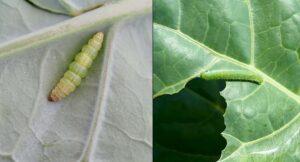
Left: Diamondback moth caterpillar, showing characteristic tapering at each end. Right: Imported cabbageworm caterpillar showing characteristic fuzziness. Pictures by Maria Cramer.
We’re seeing caterpillar activity (imported cabbageworm in the North and diamondback moth in the South) in cabbage and other cole crops. Treatment thresholds vary between crops and growth stage, but for heading cole crops between early vegetative and cupping, the treatment threshold is 30%. At this stage, sprayable Bt products (IRAC 11A) such as Dipel, Xentari, or Javelin can be effective on young imported cabbage worm caterpillars. Other materials approved for caterpillar control include Entrust/Radiant (IRAC 5), Proclaim (IRAC 6), Torac (IRAC 21A), and Exirel (IRAC 28). Diamondback moth has resistance to many insecticide groups, and pyrethroids (IRAC 3A) are not effective for their management. For Bt products and contact insecticides, coverage on the undersides the leaves is essential.
Tomatoes
In high tunnels and the first field plantings of tomatoes, we’re seeing limited aphid, thrips, and spider mite activity. If dealing with primarily aphids, products such as Beleaf (IRAC 29) are recommended, especially if plants have reached the flowering stage. We have seen aphid populations decline over the last couple of weeks without spray, probably due to lady beetle predation and parasitism from wasps. For thrips, Entrust, Radiant (IRAC 5) and Torac (IRAC 21A) can be used. For spider mites, Nealta (IRAC 25) is an effective material that is more friendly to beneficial insects, but Portal (IRAC 21A) and other materials can be used to manage populations. We’ve seen very few Colorado Potato Beetles, so while no controls are needed yet, we’ll keep an eye out for increasing populations.
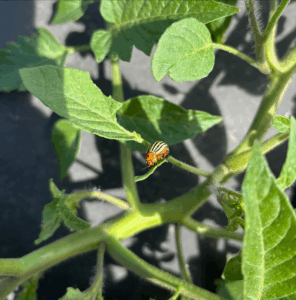
Colorado Potato Beetle adult
Beneficials
While scouting we’ve seen many beneficial insects, including predators like lacewings, lady beetles, and spined soldier bugs, as well as signs of parasitism, like aphid mummies. These natural enemies can help suppress certain pest populations. Lacewings, lady beetles, and soldier bugs feed on a wide range of soft-bodied pests, including aphids and caterpillars. Parasitoid wasps are more specialized, attacking one particular host. Basing sprays on treatment thresholds and using more selective insecticides helps preserve these natural enemies.
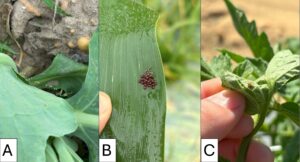
A) Green lacewing eggs on the underside of a cabbage leaf, B) Recently hatched spined soldier bug nymphs, and C) An aphid mummy. Pictures by Maria Cramer.
Please consult the Mid-Atlantic Commercial Vegetable Production Guide for a more comprehensive list of materials that are labeled for specific crops and pests. As always, be sure to follow label rates and application instructions.
Authors: Amanda Quadrel (Northern NJ Veg IPM coordinator) and Maria Cramer (Southern NJ Veg IPM coordinator)
Deer Damage Control in the Vineyard
New Jersey’s high deer population significantly threatens vineyards, particularly those near wooded areas. Deer are a pest, especially on young vines and in the early growing season when food sources are scarce, and tender shoots are emerging. If the vineyard is close to the deer population, management is needed for the long-term productivity of the vineyards.
Identifying the deer damage: Deer browse on leaves and tender shoots using the lower front teeth. Deer do not have upper incisors, so the leaves browsed by deer have a rough, torn, and shredded appearance but no tooth marks (Figure 1). This can cause substantial crop loss and even compromise the health of the vines, specifically if the same vine is damaged over the years (Figure 1). Fortunately, secondary buds of grapevines can grow and produce replacement shoots when the actively growing shoot tip from the primary bud is damaged. A new shoot from a basal bud may not be as productive, however, it will ensure new vegetative growth, sustaining the canopy of the grapevine. [Read more…]
Vegetable IPM Update 5/15/25
Greetings from the Veg IPM team! No major changes have taken place between last week and this week, and with the rainy weather, scouting has been limited.
Sweet Corn
We’ve put out corn earworm pheromone traps throughout the state. While silking corn is the main target of CEW activity, we set the traps early to detect overwintering moths, which have become more common with warmer winters. As a reminder, we’re no longer using blacklight traps as of this year, and we’ll be reporting pheromone trap counts in the Plant Pest Advisory as the season progresses. So far, we haven’t spotted any corn pests through visual inspection.
Cole Crops

Flea beetle surrounded by feeding damage. Picture by Maria Cramer.
Flea beetle are active in various cole crops. This year, they have been especially prevalent in Napa cabbage and bok choy. Young plants are especially vulnerable to attack from flea beetles. The treatment threshold for flea beetles in heading cole crops is 50% infestation.
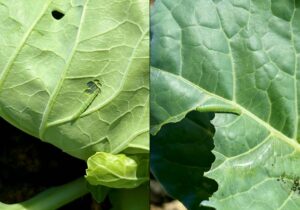
Left: Diamondback moth caterpillar, showing characteristic tapering at each end. Right: Imported cabbageworm caterpillar showing characteristic fuzziness. Pictures by Maria Cramer.
We’re seeing caterpillar activity (imported cabbageworm and diamondback moth) in cabbage and other cole crops. Treatment thresholds vary between crops and growth stage, but for heading cole crops between early vegetative and cupping, the treatment threshold is 30%. At this stage, sprayable Bt products (IRAC 11A) such as Dipel, Xentari, or Javelin can be effective on young caterpillars. Other materials approved for caterpillar control include Entrust/Radiant (IRAC 5), Proclaim (IRAC 6), Torac (IRAC 21A), and Exirel (IRAC 28). For Bt products and contact insecticides, coverage on the undersides the leaves is essential.
Tomatoes
In high tunnels and the first field plantings of tomatoes, we’re seeing limited aphid, thrips, and spider mite activity. If dealing with primarily aphids, products such as Beleaf (IRAC 29) are recommended, especially if plants have reached the flowering stage. For thrips, Entrust, Radiant (IRAC 5) and Torac (IRAC 21A) can be used. For spider mites, Nealta (IRAC 25) is an effective material that is more friendly to beneficial insects, but Portal (IRAC 21A) and other materials can be used to manage populations.
Please consult the Mid-Atlantic Commercial Vegetable Production Guide for a more comprehensive list of materials that are labeled for specific crops and pests. As always, be sure to follow label rates and application instructions.
Authors: Amanda Quadrel (Northern NJ Veg IPM coordinator) and Maria Cramer (Southern NJ Veg IPM coordinator)
Vegetable IPM Update 5/08/25
Sweet Corn
We’ve put out corn earworm pheromone traps throughout the state. While silking corn is the main target of CEW activity, we set the traps early to detect overwintering moths, which have become more common with warmer winters. As a reminder, we’re no longer using blacklight traps as of this year, and we’ll be reporting pheromone trap counts in the Plant Pest Advisory as the season progresses.
Cole Crops

Flea beetle surrounded by feeding damage. Picture by Maria Cramer.
Flea beetle are active in various cole crops. This year, they have been especially prevalent in Napa cabbage and bok choy. Young plants are especially vulnerable to attack from flea beetles. The treatment threshold for flea beetles in heading cole crops is 50% infestation.

Left: Diamondback moth caterpillar, showing characteristic tapering at each end. Right: Imported cabbageworm caterpillar showing characteristic fuzziness. Pictures by Maria Cramer.
We’re seeing caterpillar activity (imported cabbageworm and diamondback moth) in cabbage and other cole crops. Treatment thresholds vary between crops and growth stage, but for heading cole crops between early vegetative and cupping, the treatment threshold is 30%. At this stage, sprayable Bt products (IRAC 11A) such as Dipel, Xentari, or Javelin can be effective on young caterpillars. Other materials approved for caterpillar control include Entrust/Radiant (IRAC 5), Proclaim (IRAC 6), Torac (IRAC 21A), and Exirel (IRAC 28). For Bt products and contact insecticides, coverage on the undersides the leaves is essential.
Tomatoes
In high tunnel tomatoes, we’re seeing limited aphid, thrips, and spider mite activity. If dealing with primarily aphids, products such as Beleaf (IRAC 29) are recommended, especially if plants have reached the flowering stage. For thrips, Entrust, Radiant (IRAC 5) and Torac (IRAC 21A) can be used. For spider mites, Nealta (IRAC 25) is an effective material that is more friendly to beneficial insects, but Portal (IRAC 21A) and other materials can be used to manage populations.
Please consult the Mid-Atlantic Commercial Vegetable Production Guide for a more comprehensive list of materials that are labeled for specific crops and pests. As always, be sure to follow label rates and application instructions.
Authors: Amanda Quadrel (Northern NJ Veg IPM coordinator) and Maria Cramer (Southern NJ Veg IPM coordinator)
